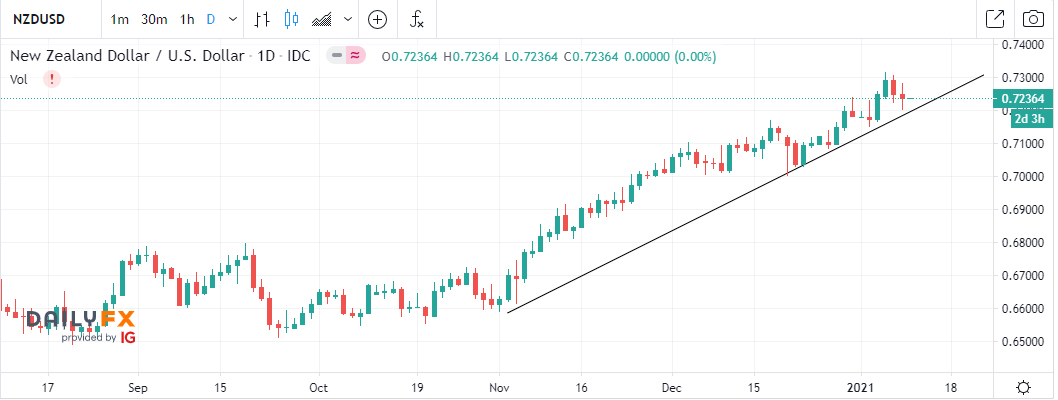
Summary of key points: -
- Positives fuelling equity markets ruled out any downward NZD correction
- Mixed signals from offshore financial and investment markets
- NZ economic outlook not as rosy
The NZD/USD exchange rate commences the New Year of 2021 at a three-year high (last above 0.7300 in April 2018).
The downward correction in the Kiwi dollar to the 0.6800/0.6900 region that this column anticipated through the December/January period has had no opportunity to occur (yet!). No catalyst has emerged to cause a change to the ongoing march upwards in US equity markets, therefore ongoing NZD gains. The NZD/USD rate climbed to a high of 0.7308 on 7th January, however it has since pulled-back a fraction to 0.7240 as the EUR/USD rate reversed from $1.2350 to $1.2220 on Friday 8th January.
The dominant influencing factor over the Kiwi movements through the Christmas/New Year holiday period has been the continuing spectacular gains by US equity markets, buoyed by the continuing candy of monetary policy money printing and Government fiscal stimulus money. The close linkage to equity market direction will continue for the Kiwi in the absence of other larger forces causing it to appreciate or depreciate.
The sharp NZD gains from 0.7100 to 0.7300 over the holiday period were exaggerated by thinner, illiquid FX market conditions.
Local meat exporting companies continue to sell USD/buy NZD in significant volumes each week through the peak of the lamb season at this time as they hedge the currency risk as they buy the livestock from farmer suppliers. Unlike other large USD exporters, they hedge each week to protect the weekly NZD price schedule they apply to buy the livestock.
Back in mid-December the view was that at the NZD/USD was already in “over-shoot” territory at 0.7100, given the rapid rise from 0.6600 in late October. Profit-taking before the end of 2020 in both US equity markets and the NZD/USD FX market was expected to cause a downward correction. The rapid roll-out of the Covid vaccine in December and the passing of the US Government’s latest fiscal stimulus package provided more fuel to the markets and ruled out any price correction. A fair summation of recent equity market and NZ dollar FX market movements might be that all the “good news” is now fully priced-in, therefore further gains from current levels may be harder to achieve.
Picking the exact top of the tear that the NZD/USD rate has been on since October is nigh impossible, however many years ago an investment banking FX proprietary trading acquaintance in the Kiwi dollar always had the view that the Kiwi consistently goes three cents further (up and down) than what you expect.
A continuation of the US dollar weakness against all currencies in global forex markets has been the largest risk that local USD exporters have hedged against over the last 12 months. That risk has now occurred (the EUR/USD rate moving from $1.1000 to $1.2350), therefore local exporters should now be allowing their hedge percentages to decline by not replacing maturing hedges at these levels.
On the other hand, local USD importers who have been operating hedge percentages at policy minimums for a considerable time now, should take the opportunity to increase hedging as the risk of a downward correction has arguable increased.
Mixed signals from offshore financial and investment markets
Totally distorted markets are the norm in the global post-Covid economic era we are now entering. Amidst all the distortions, we can still interpret the messages the markets are providing in forming a view on future NZD/USD exchange rate direction from current levels above 0.7200.
Deciphering the signals in terms of what it means for short-term and more medium-term currency direction is always the challenge, but here is my shot at it: -
- US equity markets and political developments - US equity market analysts and commentators were originally anticipating that a split Congress (Republicans with a Senate majority as a natural check on a Democrat House of Representatives and Democrat President) would be more positive for the markets in 2021 as aggressive tax increases would be less likely. The State of Georgia election run-off result for two Senators ended that hope last week, the Democrats have now completed the three-peat. However, the equity market chose to focus on the short-term positive factor that there would be more immediate fiscal stimulus money for the US economy after Joe Biden is sworn in as President on 20th January.
- US equity markets and deflating bubbles – The vast majority of commentators now see the US equity market gains as a speculative bubble, they just do not know the timing of the inevitable bursting and thus a downward market correction. The Covid vaccine rally in November and December added to the monetary and fiscal candy the equity market has been dining out on for some time now. Signs are emerging that the candy is running out. There is now a massive chasm between the sky-high equity market pricing and the sobering reality in US economic performance (as the fall in the December jobs data testified).
- Bond market is already correcting – The very recent sharp rise in US 10-year Treasury Bond yields to 1.12% (from record lows of 0.50% in August and 0.80% in early December) is being caused by profit-taking on long bond positions, increasing inflation expectations and the US requiring higher interest rate yields to attract in foreign capital to fund their dual deficits (Budget and Balance of Payments). The US bond market is telling us that the US dollar sell-off over the last nine months may have run its course, as US long-term yields are now so much higher than those in Europe. The further implication for the NZD/USD exchange rate is that rising market interest rates was always going to be the one variable that sparks a major downward correction in equity markets. The Kiwi has lifted on the equity market hype of recent months, it will fall on the inevitable equity market correction.
- US dollar depreciation earlier than forecast – Several months ago big investment banks such as Citigroup and Goldman Sachs were forecasting the US dollar to depreciate against the Euro to $1.2500 by the middle of 2021. What will be surprising to those forecasters is that the USD has already sold-off to near that level in just two months. The risk of further significant USD depreciation on global FX markets in 2021 has considerably reduced because most of the deterioration has already occurred.
- Commodity markets next to correct? – Strong Chinese industrial demand and some supply constraints (caused by Chinese trade bans on imports from Australian) drove metal and mining prices sharply higher over the second half of 2020. The word’s number one commodity currency, the Aussie dollar, has posted spectacular gains to 0.7800 against the USD as a result. Similar to the equity markets, a downward correction in commodity prices appears inevitable. The catalyst for the correction will likely be some change in official commands for the economy in China.
NZ economic outlook not as rosy
The NZ economy also dined out on short-term fiscal and monetary candy over the last nine months of 2020. Looking ahead into 2021, the proverbial headwinds for the economy are starting to emerge with fiscal/monetary stimulus reducing in intensity, lamb/beef prices lower, borders re-opening further away and the minimum wage legislation resulting in lower employment levels. Covid uncertainties will continue to restrict business investment and expansion.
While our exporters have generally been well hedged against the USD currency weakness, inevitably the sharply higher NZD/USD exchange rate above 0.7000 will dampen growth in the export economy in 2021.
In the short-term, exporters will be eying the NZD/USD chart below and hoping that a close below 0.7200 over coming days will signal a breaking of the uptrend line that has run since 0.6600 in October. A sizable correction to the dramatic seven cent NZD/USD gain over the last 2½ months also seems inevitable.

Daily exchange rates
Select chart tabs
*Roger J Kerr is Executive Chairman of Barrington Treasury Services NZ Limited. He has written commentaries on the NZ dollar since 1981.
7 Comments
I def see the USD continuing to weekend with the changing administration, money printer continuing to go brr and the potential for more US helicopter money. Exchange rate still has a good bit to run if we head back into the 80c range.
What can screw stuff at home.. maybe the government bringing in more shit regulations, or the massive increase in council rates might actually cause some people to put up a fight about the endless increases. But I think we have a few more years before people grow the balls to do that. Can not continue at curretn rates though...
Re: council rates I completely agree.
Councils such as Auckland are an utter disgrace: thousands of coordinators, all sorts of pen-pushers, hordes of PR and marketing personnel, middle managers, consultants of all types, etc. etc. should be removed from the payroll, immediately. The salary levels at Auckland council, at some levels of the organization, are a sick joke and should be revised downwards, right now.
The amount of waste on pet projects of very dubious utility is eye-watering. The total disregard for the ratepayers' money is sickening. The complete disregard of the recent Auckland ratepayers' poll, overwhelmingly asking for an increase limited to an overage of 2.5%, is insulting.
I can't understand why the heck we Auckland ratepayers put up with this shameful conduct. It is time to get rid of these clowns and elect somebody who has the balls to really reduce the amount of wastage of councils such as Auckland, and take the unpopular but necessary measures.
95% of people are more than happy to pay more rates when every 3 years their property valuation increases significantly. Much of the rates are a fixed cost and the amount you end up paying is totally manipulated and follows no set formula anyway, clearly it is to get exactly a 2.5% increase year on year regardless of the unknown value your RV is going to be. Its totally controlled so they can see the total amount they will collect. If your RV ever went down your rates would still go up. The next ratings valuations in Tauranga in only 6 months time are going to be staggering considering the recent gains, your average house will jump at least $100K.
What does a world with an impotent USD look like? This is such a fundamental change to the status quo of the last 100 years, that I'm not surprised about the lack of commentary because none of us have seen it in our lifetime. But I'd be surprised if a weak USD can maintain it's global reserve status over the medium term. As an example of a single point in this giant complex dataset: it will n-times the cost of the US military-industrial complex, and that alone is likely to completely change the structure of the existing world order.
I agree Ezy. China has plans to double its economy by 2035 and I believe they will do it. The USD as the worlds reserve currency is coming to an end, its inevitable as they have killed the confidence in it due to money printing. A new digital currency is coming and its not far away now I'm picking a year or two tops. Biden is going to be left holding the can.




We welcome your comments below. If you are not already registered, please register to comment.
Remember we welcome robust, respectful and insightful debate. We don't welcome abusive or defamatory comments and will de-register those repeatedly making such comments. Our current comment policy is here.